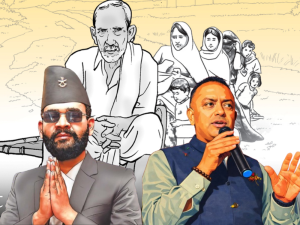Columns
Trivialising the apex court
When the executive flouts the judiciary's decisions, it raises questions on the constitution's legitimacy.
Bishesh Joshi & Laabhesh Thapa
A Supreme Court of any democratic nation balances the state on its shoulders. In a social contract between the state and its citizens, the judiciary acts as a custodian of the contract through the instrument of the constitution. The essence of any contract is trust, and if this shrine of trust is mangled, then the citizens shall revolt against the state. In Nepal, the shrine of this trust seems to be diminishing, as the other two organs of the trias politica are flouting the orders of the country's apex court. The “balance of power” scale seems to be skewed, and the citizens' faith in the guardian of the social contract seems to be eroding away. From the landmark steps of the Supreme Court to quash the citizenship requirement for pandemic relief to the compensation of victims of the Baburam Bhattarai government’s road expansion project, the government has failed to implement as many as 23 rulings of the Supreme Court.
The Constitution of Nepal promises to safeguard the citizens' rights against the arbitrary actions of the state. It is an inherent morality that runs in the veins of the Nepali constitution. Here, it is pertinent to understand that constitutions come from revolutions and wars, where the old government or form of governance is toppled, and the novel form of governance begins. Constitutions have come as a legitimising instrument of the new government, established on the cornerstone of individual liberty. Thus, the constitutions must espouse an unbiased, just, non-arbitrary candour to protect citizens through various methods like separation and balance of power.
The idea of the separation of powers is that there needs to be harmonious coordination and checks and balances between the three organs of democracy, namely the executive, the legislature and the judiciary. The roles of these institutions are not limited to “not interfering with the other” but also positively aiding the other in the effective discharge of their functions. For instance, the legislature should not have a judicial overreach or willful disobedience of the judicial order. When the executive flouts the judiciary's decisions, it raises questions on the constitution's legitimacy, the spirit of the law, constitutional values and democratic ethics. It weakens public faith in the rule of law.
In a democratic system, even if any one of the pillars is of uneven proportion, it destabilises the entire framework of the democracy in which we function. And it is appreciable if the courts take a proactive measure to curb this. Article 128(4) of the constitution mandates that anyone who obstructs the dispensation of justice and flouts or disregards court orders is held in contempt of court, and proceedings and punishments are issued for the contempt. This article is enforced through penalties or fines against regular citizens. But what about the whole institution of the government itself? Contempt of court against an entire organ of the government might entail a constitutional tragedy. This begs the question: Can the court hold the government in contempt when the legislature or the executive denies the court order?
In the case of Supreme Court of Nepal versus Home ministry, the court emphasised that the effective implementation and abidance of the court order is crucial for justice dispensation. The intention of imposing damages for the contempt of court is inspired by ensuring effective justice delivery. The court further cited the judgement of NL Patel, CJM Nadia versus State of Gujarat, wherein the Supreme Court of India held that the object of the contempt of court does not preserve the dignity of the court or the magistrate but “preserves the authority of the court to ensure an ordered life in society.”
However, despite the court’s emphasis on the abidance of court orders, the judges remain relatively silent when the court order entails the government. This could be the case primarily because often, the ministry has planned resources for expenditure, and they may not be able to spend a substantial portion of the budget in fulfilling specific court orders. However, this is no excuse. But, the meagre fine amount stipulated for contempt orders is concerning. For instance, the health minister of Delhi was in 2016 fined INR25,000 for contempt of court. In Nepal too, an amount of only Rs10,000 (as limited by the statute) could be claimed against prime minister KP Sharma Oli when he called a nonagenarian advocate a “grandpa lawyer” and insulted the court proceedings as a “drama”. However, the present legal framework regarding contempt of court is not robust and requires amendment; the meagre fine imposed does not encourage the contemnors to abide by the rulings but instead motivates them to defy them for a certain price.
There has been a certain level of judicial lethargy when it comes to the non-implementation of court decisions. Therefore, contempt of court proceedings in itself is inadequate. An independent authorised officer needs to be appointed to explicitly oversee the implementation of the court decisions and who shall be responsible for filing contempt motions if the government does not abide by it. The court's decisions must be implemented because law gains sanctity, validity, and acceptance if applied in an unbiased manner. Flouting of law by the executive opens the floodgates of the destruction of democracy, values of liberty, and the constitution itself.




 27.41°C Kathmandu
27.41°C Kathmandu




.jpg&w=200&height=120)











